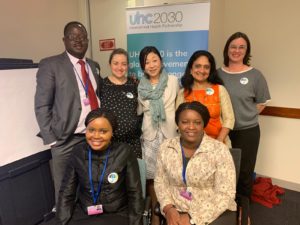 Last week during the World Bank Spring Meetings, the CSEM co-organized the ‘#HealthForAll on the Global Agenda in 2019: Building high level political support for Universal Health Coverage’ event. Held in collaboration with World Bank Health, Nutrition and Population Global Practice, the objective was to discuss how civil society can collectively advocate at the global and country level in the lead up to the High Level Meeting (HLM) on Universal Health Coverage (UHC) and beyond. In her opening remarks, Anugraha Palan, Communications Lead, Health, Nutrition and Population Global Practice at World Bank, applauded the efforts of all advocates who have worked towards Health For All. As a result of their advocacy, she said, “health ranks high on the agenda this year, not just at the HLM on UHC but at many key events such as the G20.”
Last week during the World Bank Spring Meetings, the CSEM co-organized the ‘#HealthForAll on the Global Agenda in 2019: Building high level political support for Universal Health Coverage’ event. Held in collaboration with World Bank Health, Nutrition and Population Global Practice, the objective was to discuss how civil society can collectively advocate at the global and country level in the lead up to the High Level Meeting (HLM) on Universal Health Coverage (UHC) and beyond. In her opening remarks, Anugraha Palan, Communications Lead, Health, Nutrition and Population Global Practice at World Bank, applauded the efforts of all advocates who have worked towards Health For All. As a result of their advocacy, she said, “health ranks high on the agenda this year, not just at the HLM on UHC but at many key events such as the G20.”
CSEM Coordinator Eliana Monteforte discussed advocacy initiatives led by CSEM in the buildup to the HLM, encouraging civil society organizations that are not already members to join the network. Kazumi Inden, World Bank Health Specialist and UHC2030 Core Team member, provided a broad overview of the UHC2030 movement and UN HLM on UHC: UHC2030 brings together multiple stakeholders and one of these is civil society. Civil society perspectives are important to the movement and upcoming HLM on UHC. CSEM Advisory Group member Ariana Childs Graham briefed the session on the Key Asks from the UHC Movement for the UN High Level Meeting on Universal Health Coverage and the Civil Society Priority Actions for the UN High Level Meeting on Universal Coverage, emphasizing that they are “both important and complementary instruments to advocate for an effective UN HLM on UHC.”
World Bank Representative Christoph Kurowski brought the health financing perspective to the discussion. He presented the upcoming G20 UHC Financing report which discusses the role of health financing systems in driving sustainable and equitable economic growth and accelerating global progress towards UHC. “There is consensus that countries can increase resources towards UHC, however, health systems capacity and governance have been identified as barriers,” he said. The G20 UHC Financing report will be tabled for discussion at the G20 Finance Ministers meeting on June 8-9 in Fukuoka, Japan and discussed at a joint meeting of Finance and Health ministers on the eve of the G20 Leaders’ Summit on June 27 in Osaka, Japan. Anugraha Palan added that the report will also serve as an advocacy tool that civil society can present to governments to influence health financing reforms. For more information on the G20 UHC Financing report, watch our webinar on the report here.
On April 13, Eliana Monteforte and Ariana Childs Graham participated in the ‘Financing Universal Health Coverage: Aligning Around a Country-Led Approach’ ministerial event. The session brought country leadership together with the leadership of key international agencies to highlight how they are jointly working to accelerate progress on health financing. Ministers of Finance highlighted challenges and opportunities for more effective investments in UHC at the country level. Both country representatives and multilateral stakeholders presented some major challenges including the need for improving primary health care data quality, donor coordination and alignment and building a common understanding of UHC.
Read more about civil society engagement at the World Bank Spring Meetings in this blog on the World Bank Investing in Health site.

